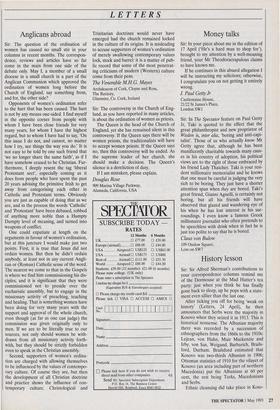LETTERS Anglicans abroad
Sir: The question of the ordination of women has caused no small stir in your columns in recent months. The correspon- dence, reviews and articles have so far come in the main from one side of the debate only. May I, a member of a small diocese in a small church in a part of the Anglican Communion which approved the ordination of women long before the Church of England, say something from, and for, the other side?
Opponents of women's ordination refer to the hurt that has been caused. The hurt is not by any means one-sided. I find myself in the opposite corner from people with whom I have been close friends for very many years, for whom I have the highest regard, but to whom I have had to say, 'On this issue I do not, and cannot, no matter how I try, see things the way you do.' It is not easy to be told by one such friend that `we no longer share the same faith', as if I have somehow ceased to be Christian. Fur- thermore, I deeply resent the tag 'liberal Protestant sect', especially coming as it does from people who have spent the past 20 years advising the primitive Irish to get away from categorising each other in Catholic and Protestant terms. Obviously you are just as capable of doing that as we are, and in the process the words 'Catholic' and 'Protestant' have been debased, robbed of anything more noble than a Humpty Dumpty level of meaning, and turned into weapons of conflict.
One could expatiate at length on the arguments in favour of women's ordination, but at this juncture I would make just two points. First, it is true that Jesus did not ordain women. But then he didn't ordain anybody, at least not in any current Angli- can or (Roman) Catholic sense of the word. The nearest we come to that in the Gospels is where we find him commissioning his dis- ciples, and it is significant that they were commissioned not to preside over the eucharistic assembly, but to engage in the missionary activity of preaching, teaching and healing. That is something women have been doing for very many years with the support and approval of the whole church, even though (as far as one can judge) the commission was given originally only to men. If we are to be literally true to our sources, not only should women be with- drawn from all missionary activity forth- with, but they should be strictly forbidden even to speak in the Christian assembly.
Second, supporters of women's ordina- tion are charged with allowing themselves to be influenced by the values of contempo- rary culture. Of course they are, but then the development of all Christian doctrine and practice shows the influence of con- temporary culture. Christological and Trinitarian doctrines would never have emerged had the church remained locked in the culture of its origins. It is misleading to accuse supporters of women's ordination of merely swallowing contemporary values lock, stock and barrel: it is a matter of pub- lic record that some of the most penetrat- ing criticisms of modern (Western) culture come from their pens.
The Venerable M.H.G. Mayes
Archdeacon of Cork, Coyne and Ross, The Rectory, Glanmire, Co. Cork, Ireland


























































 Previous page
Previous page